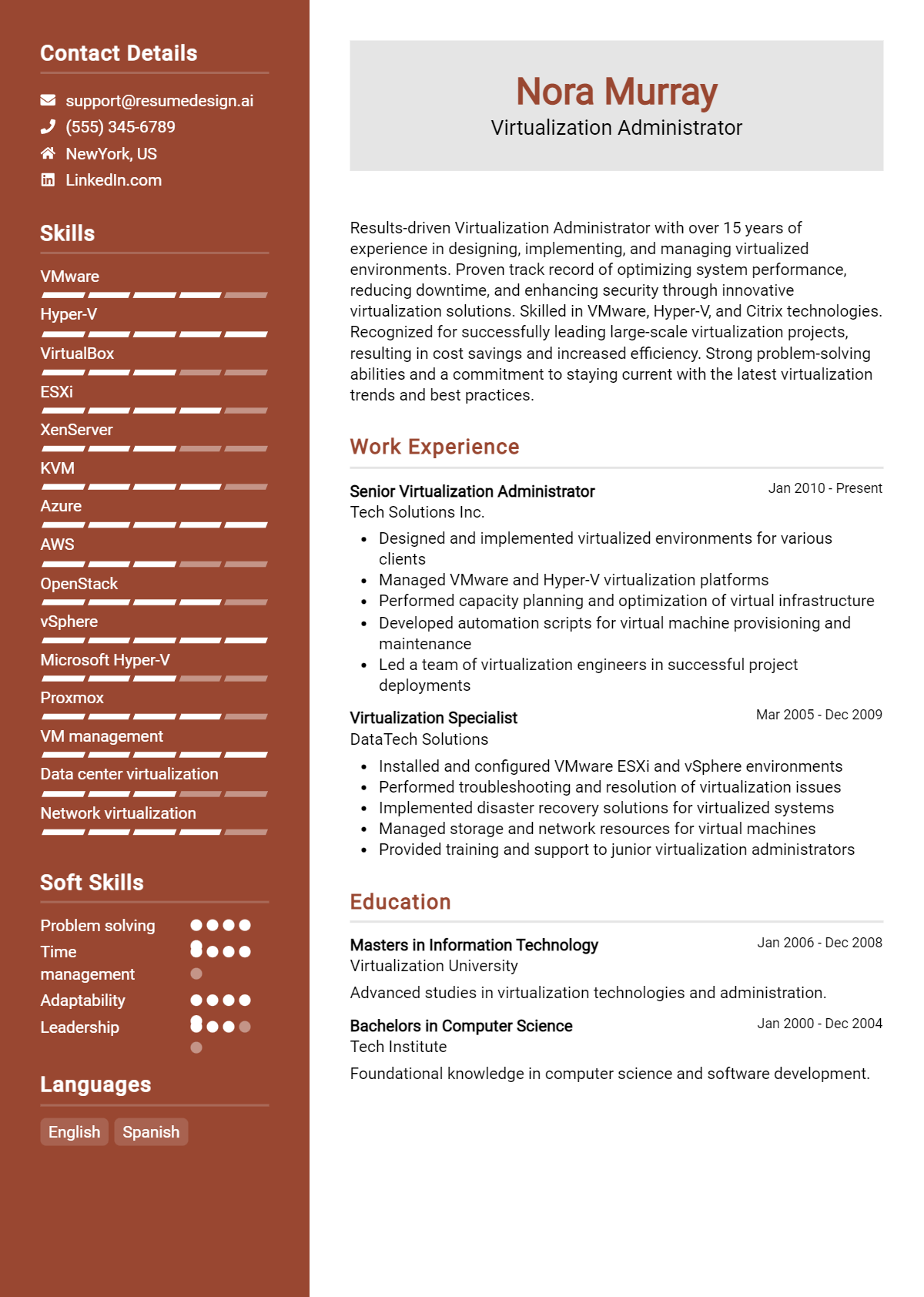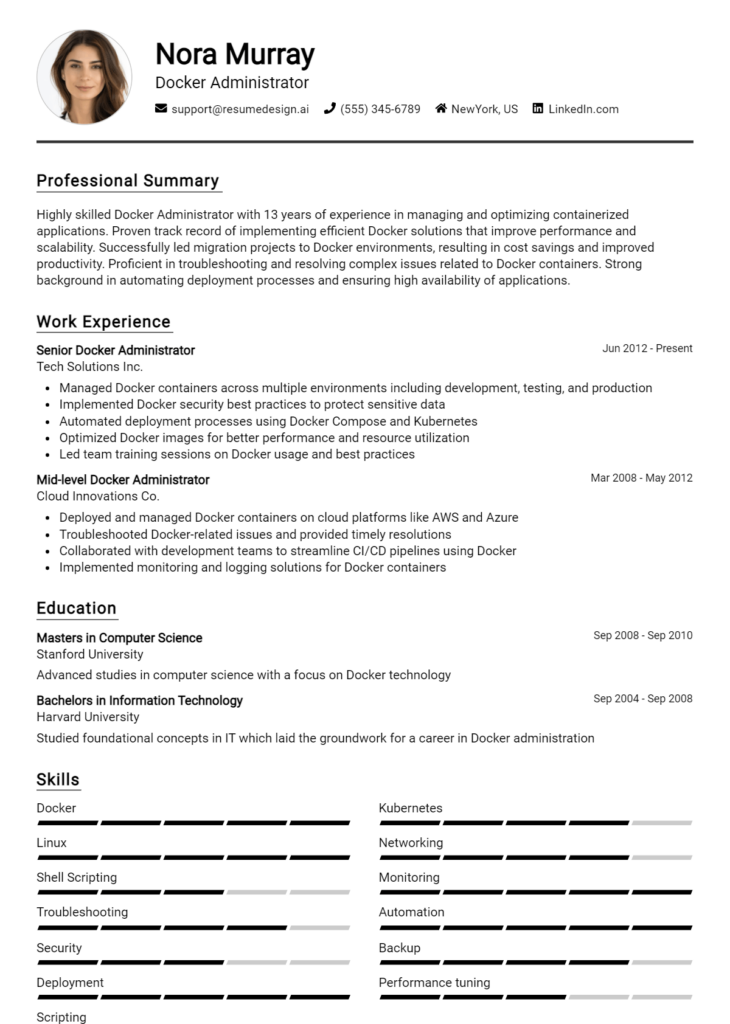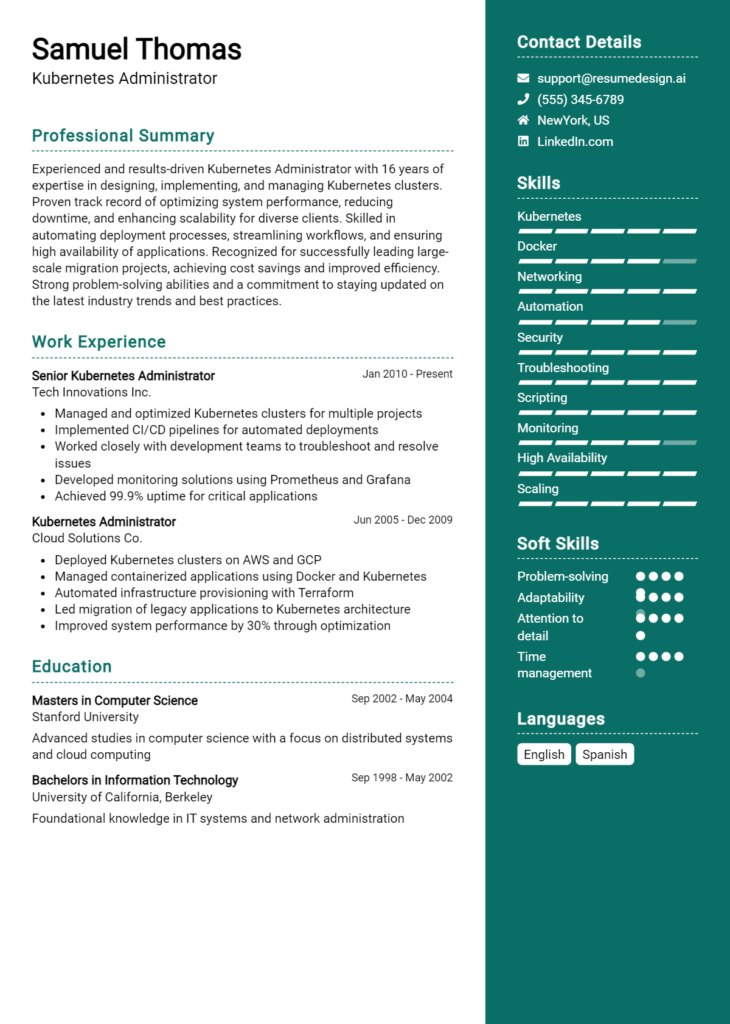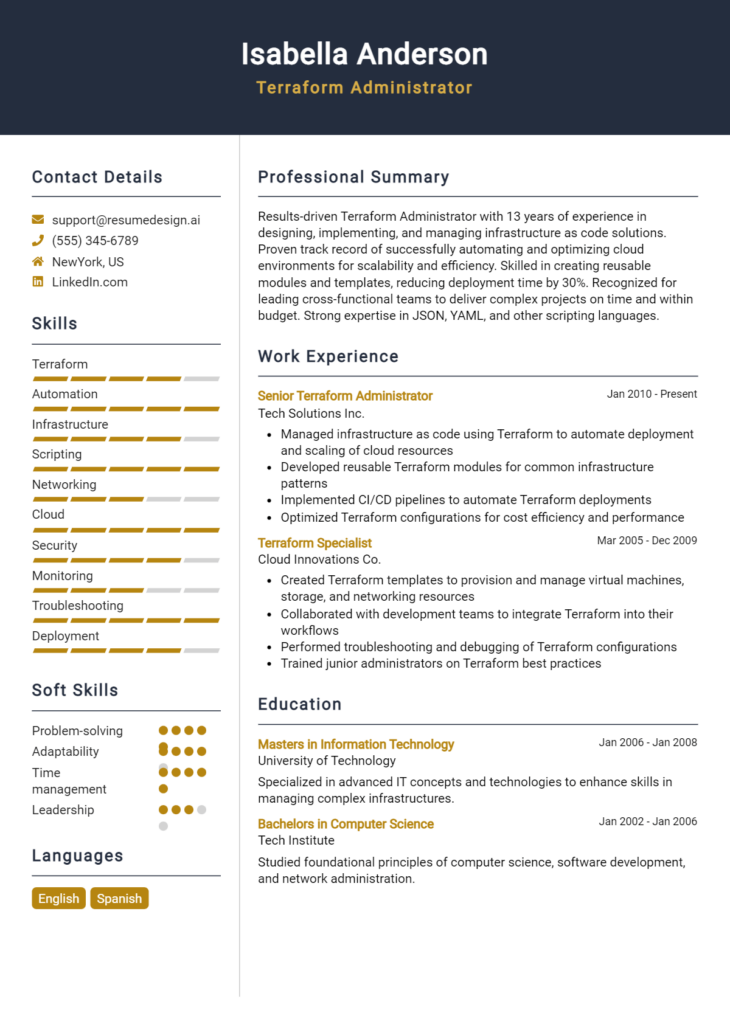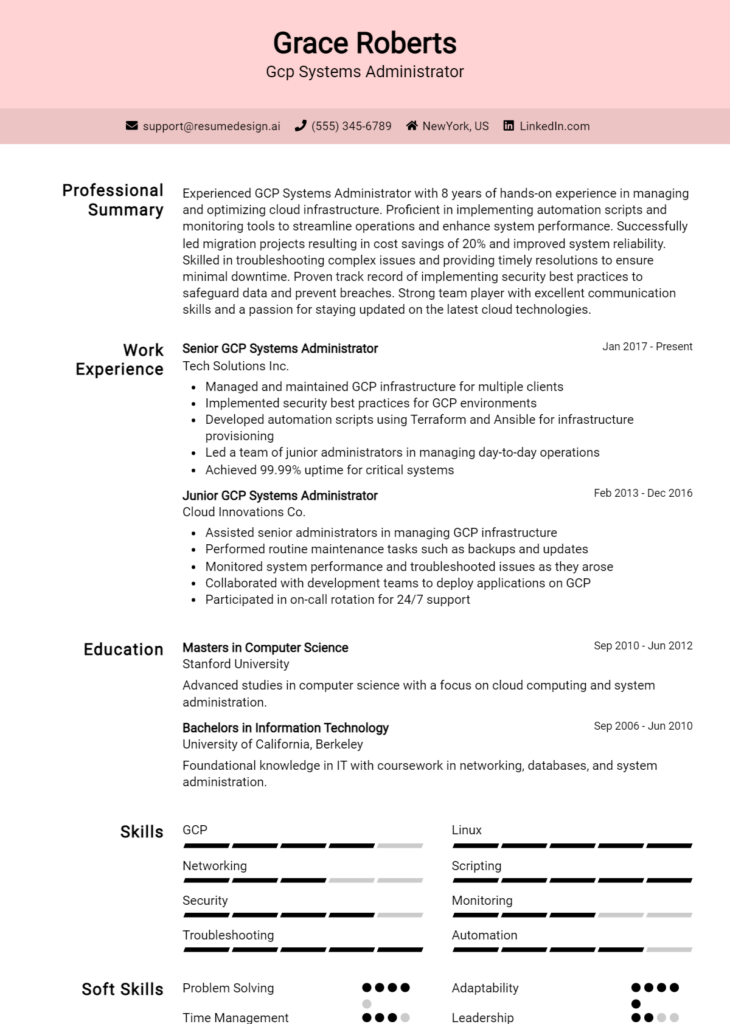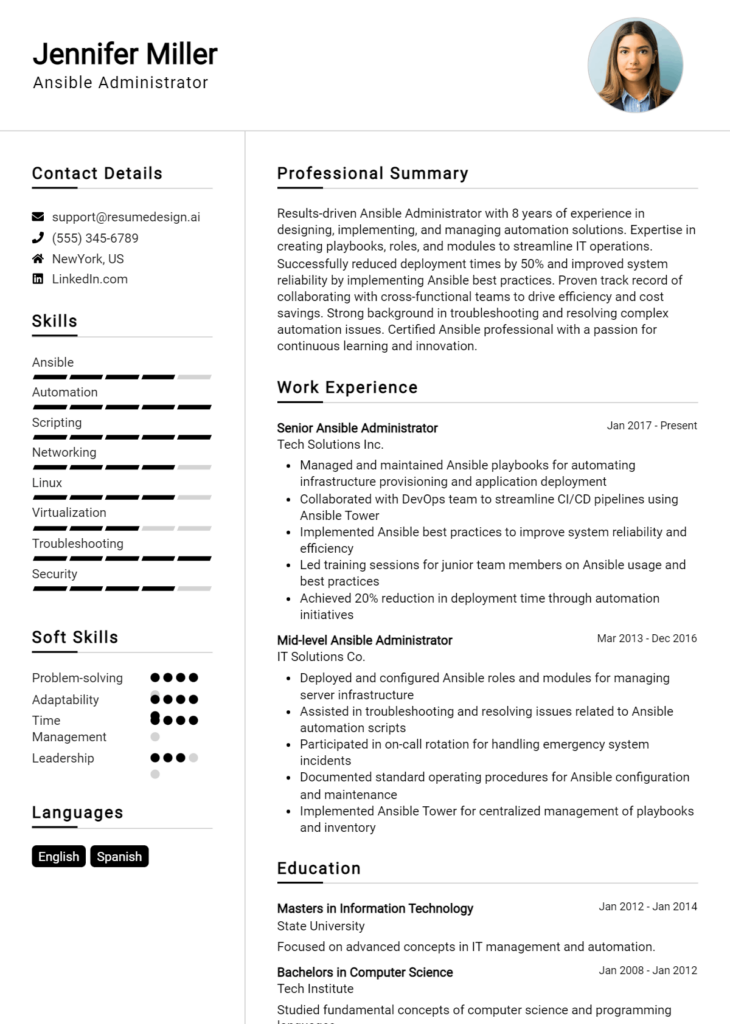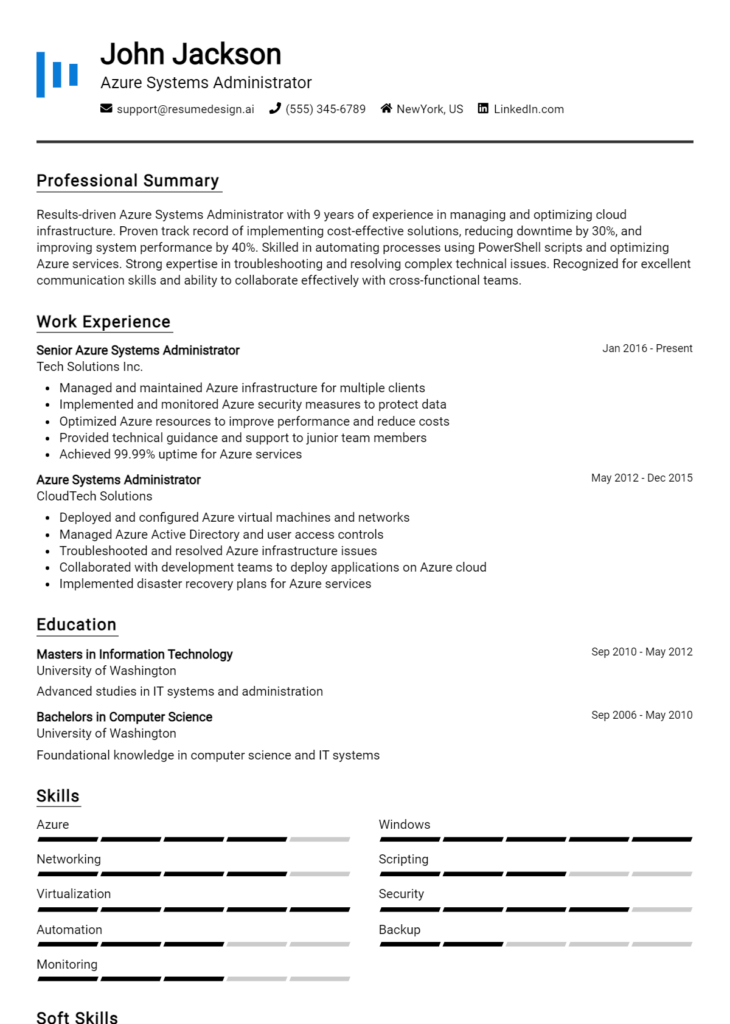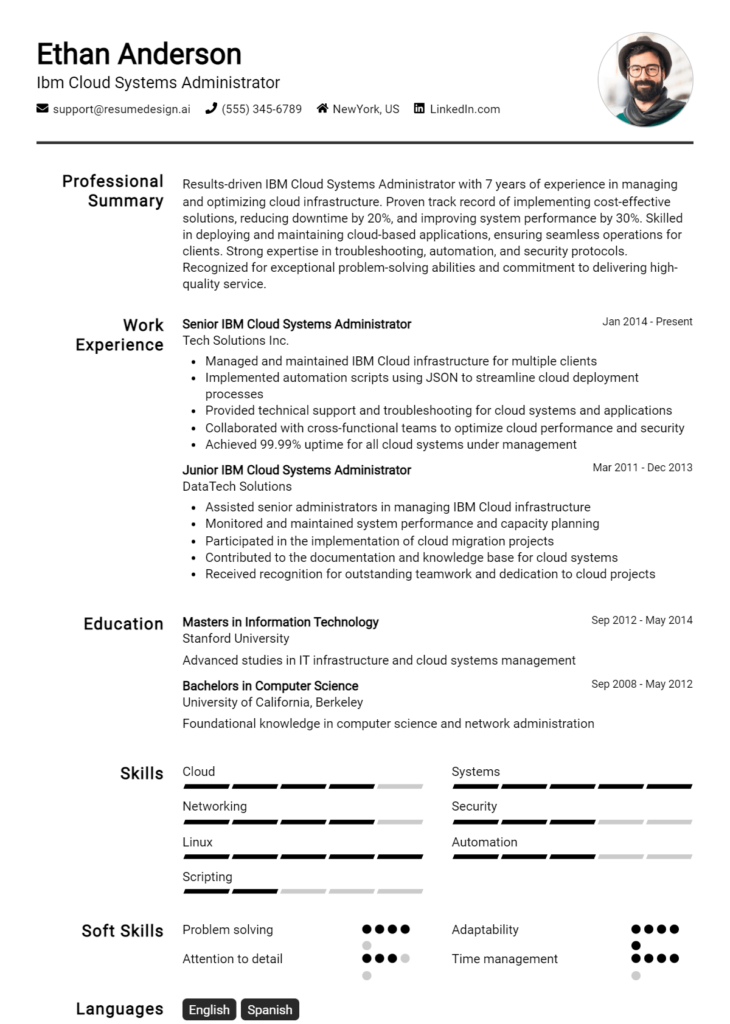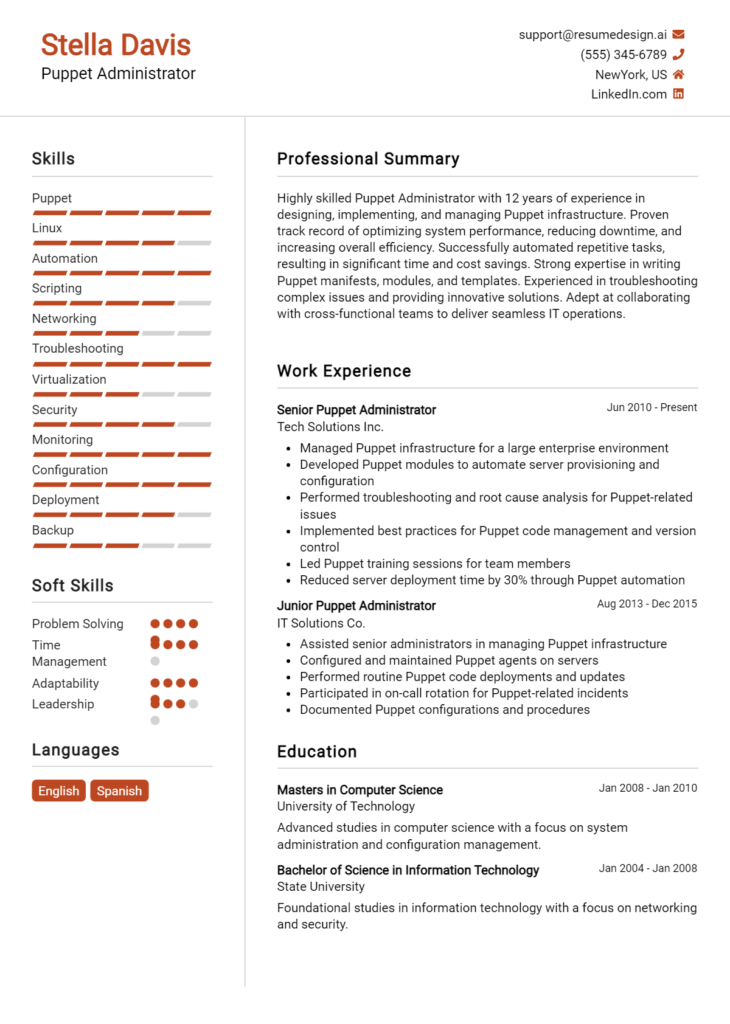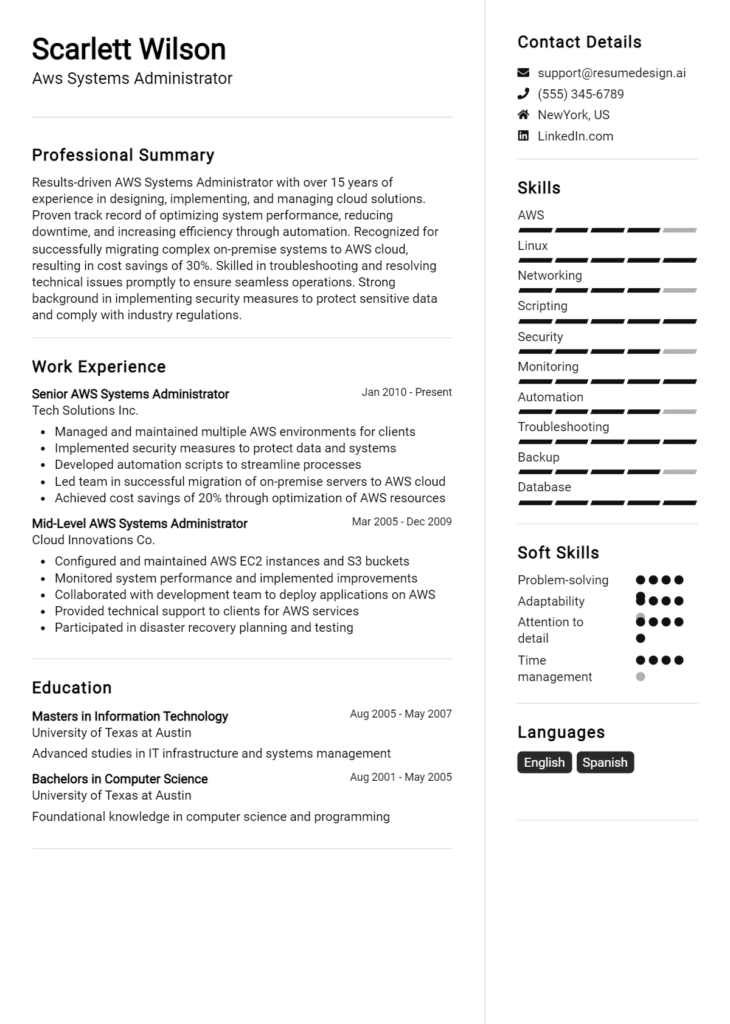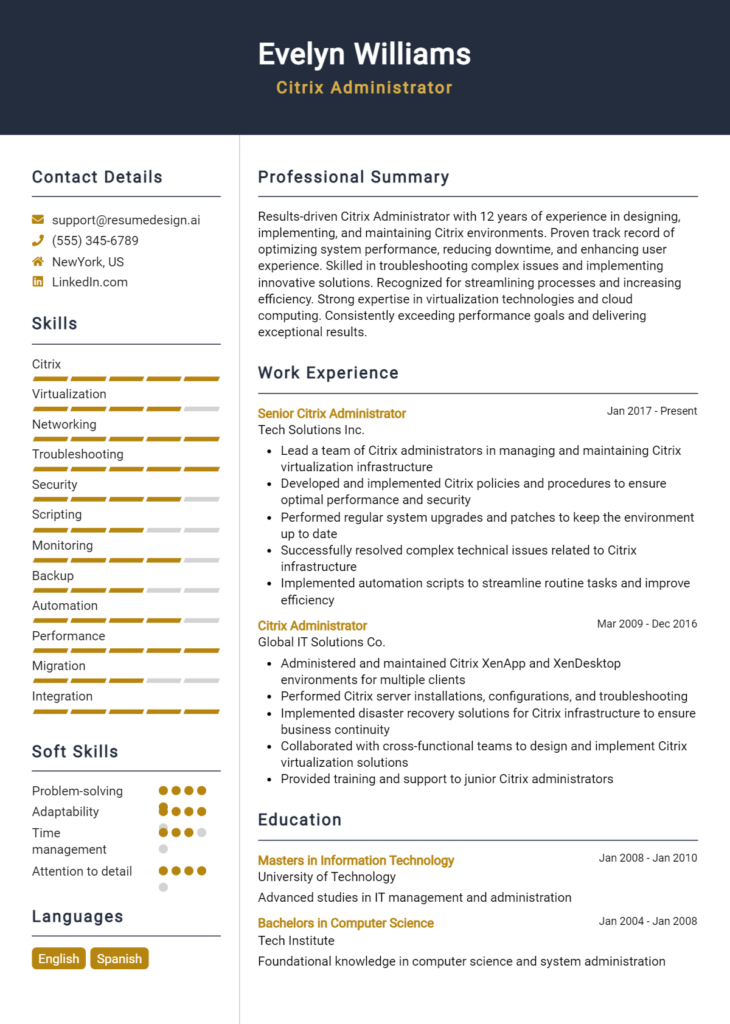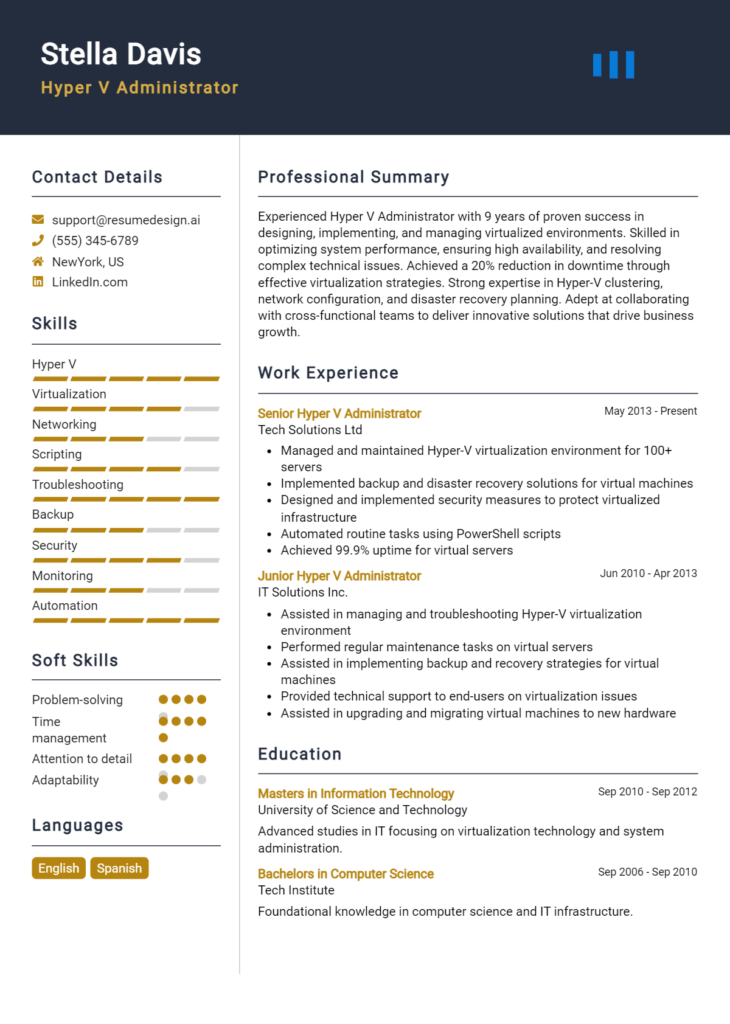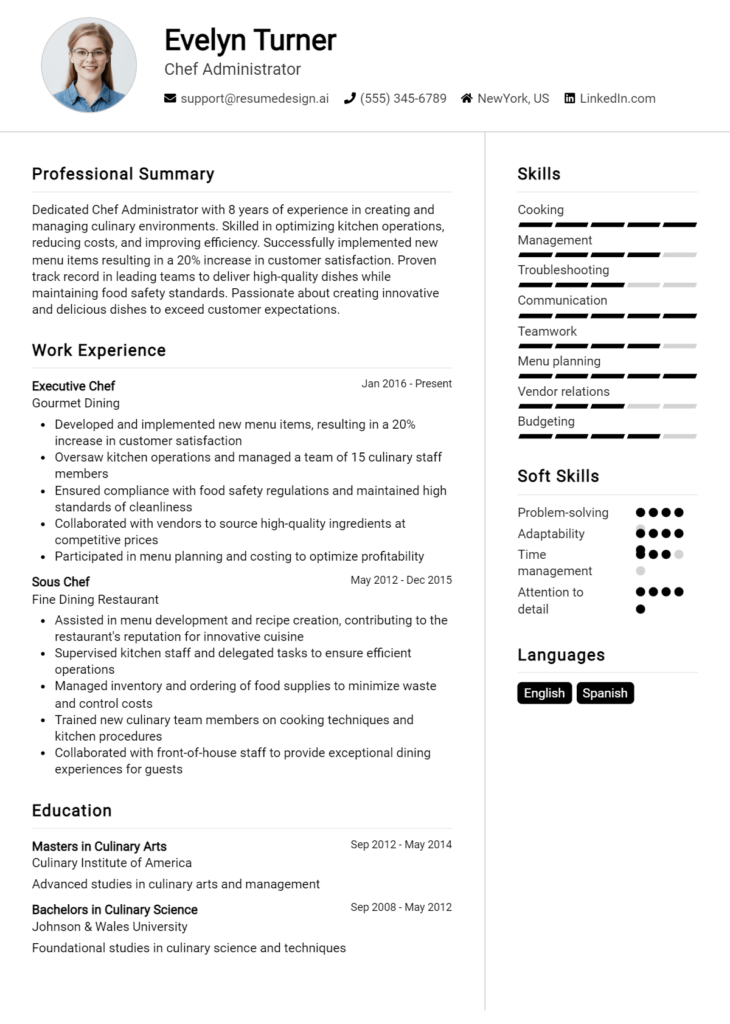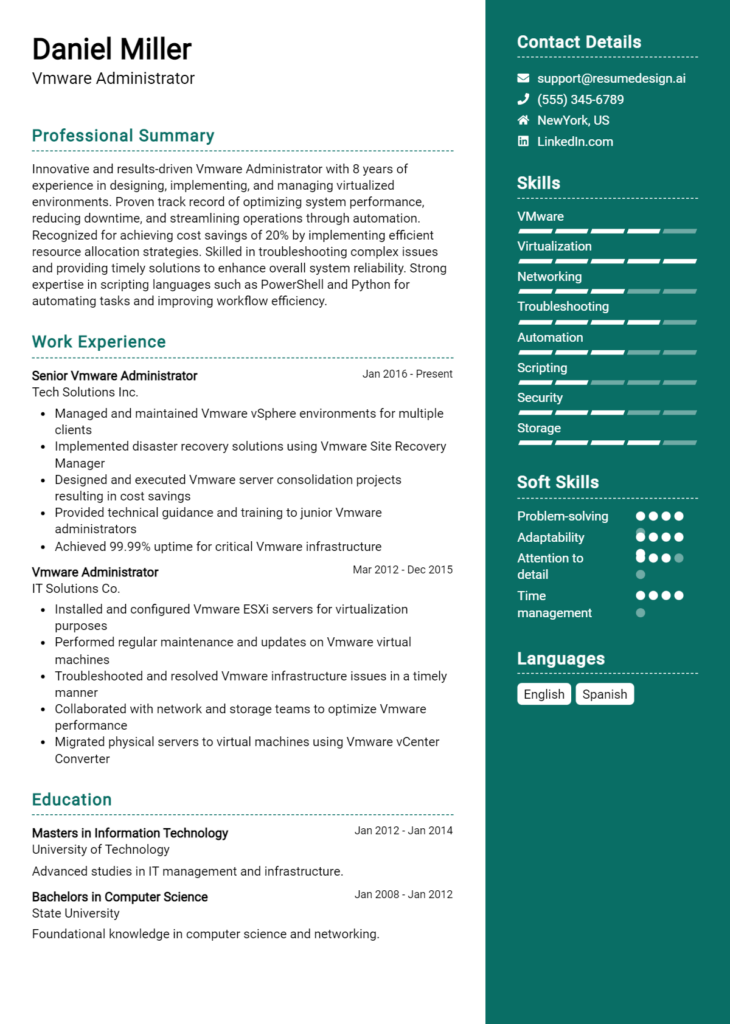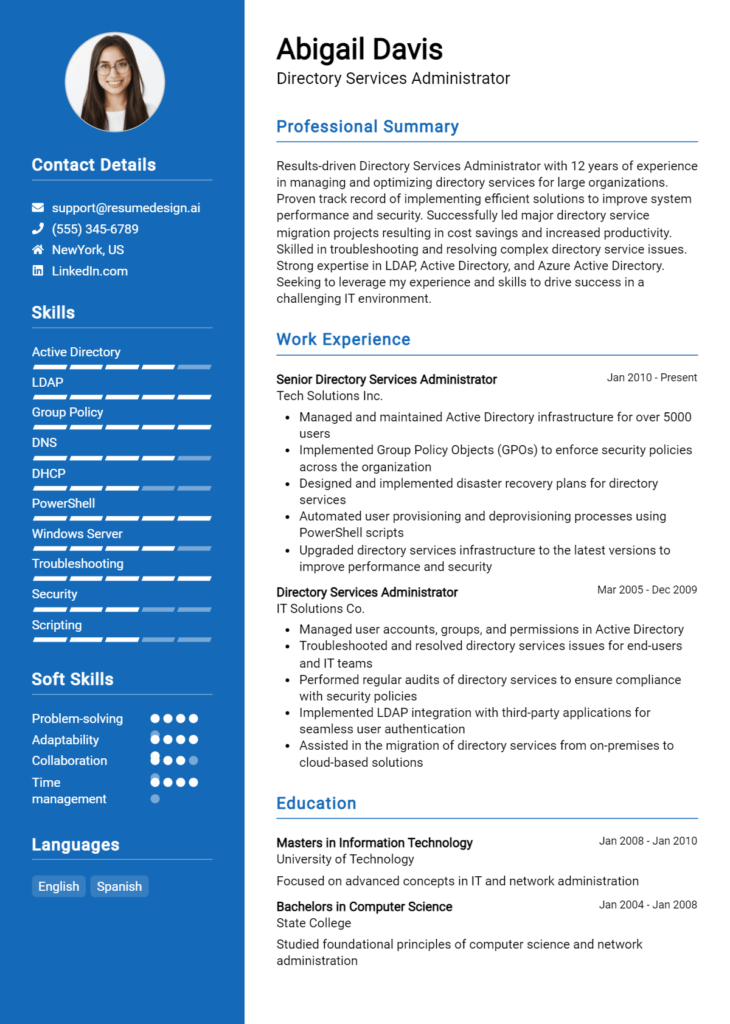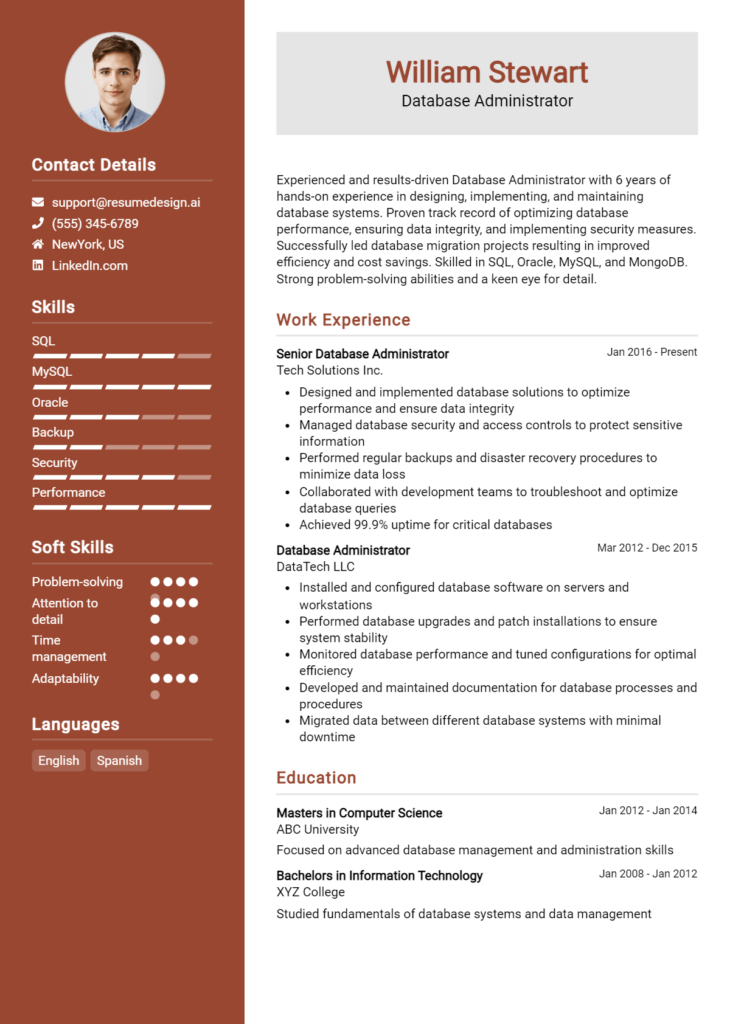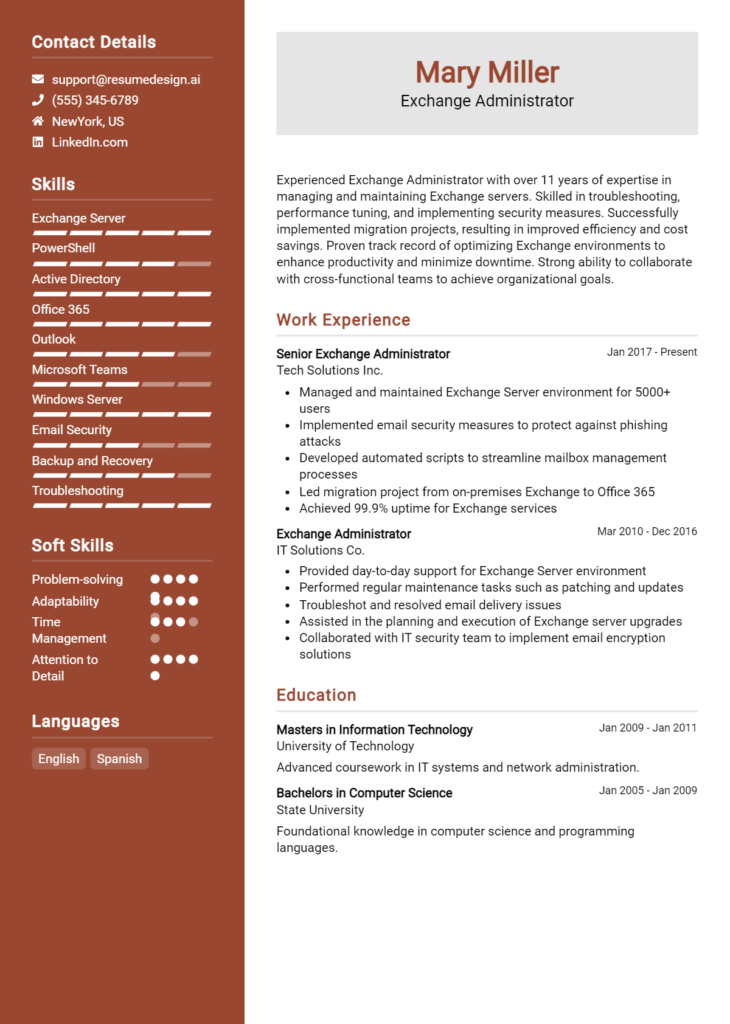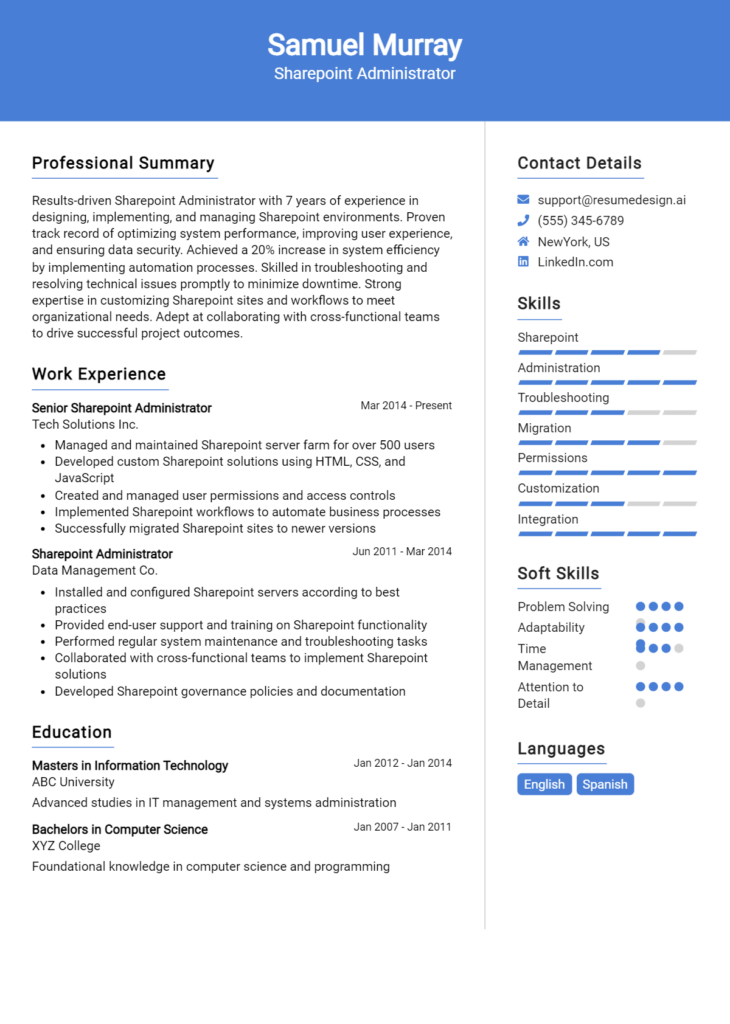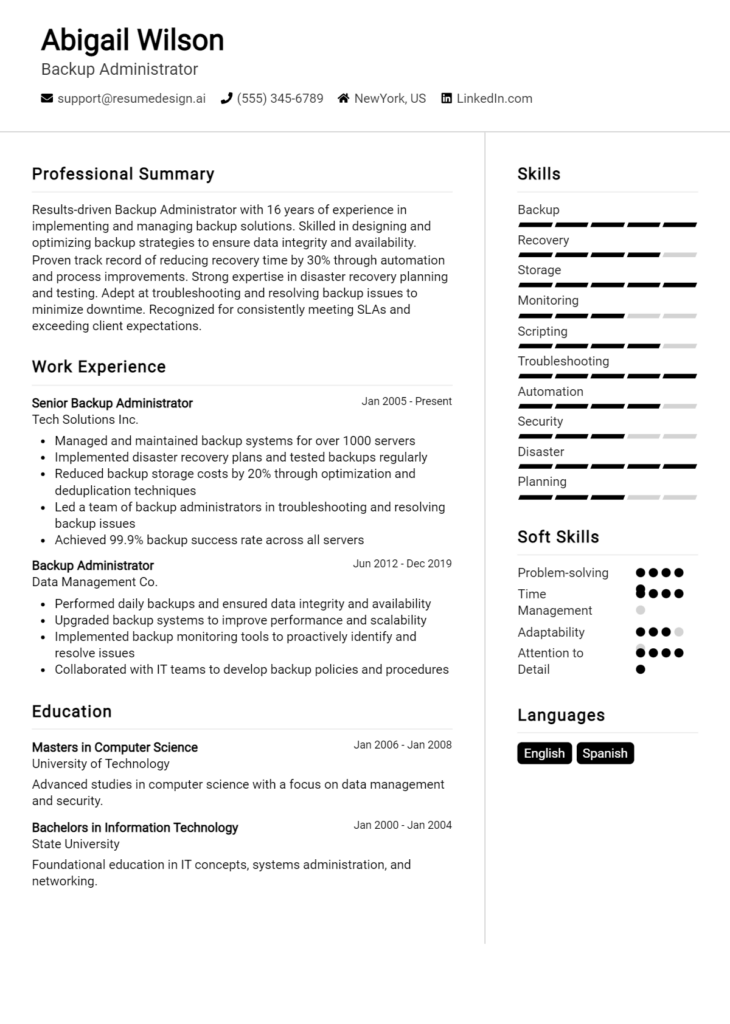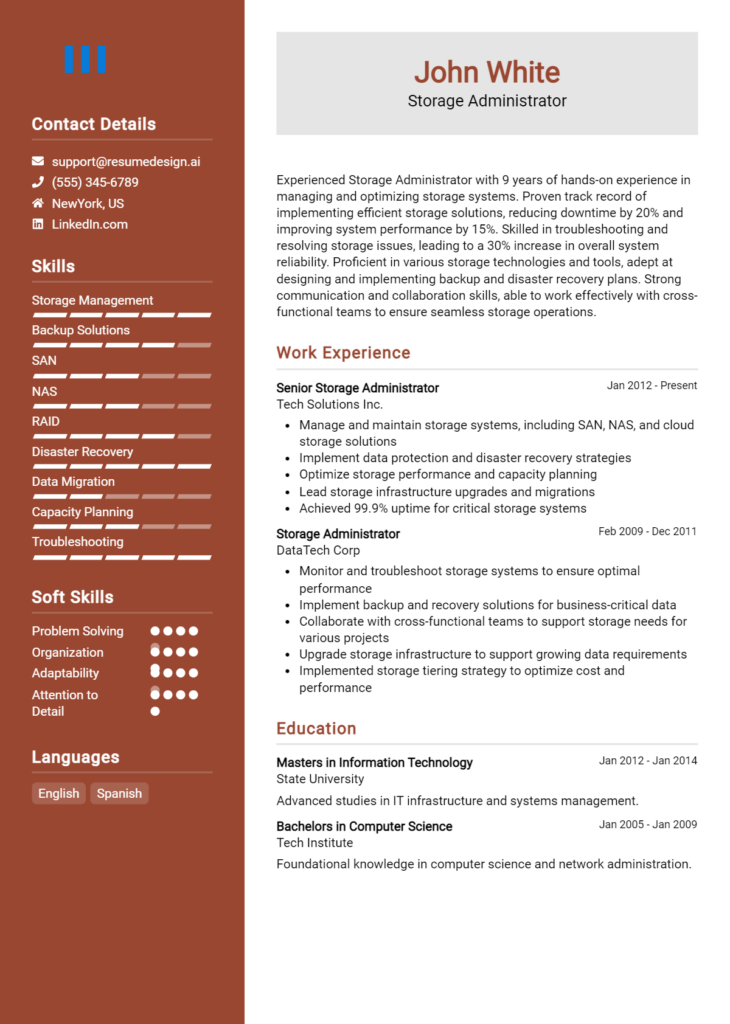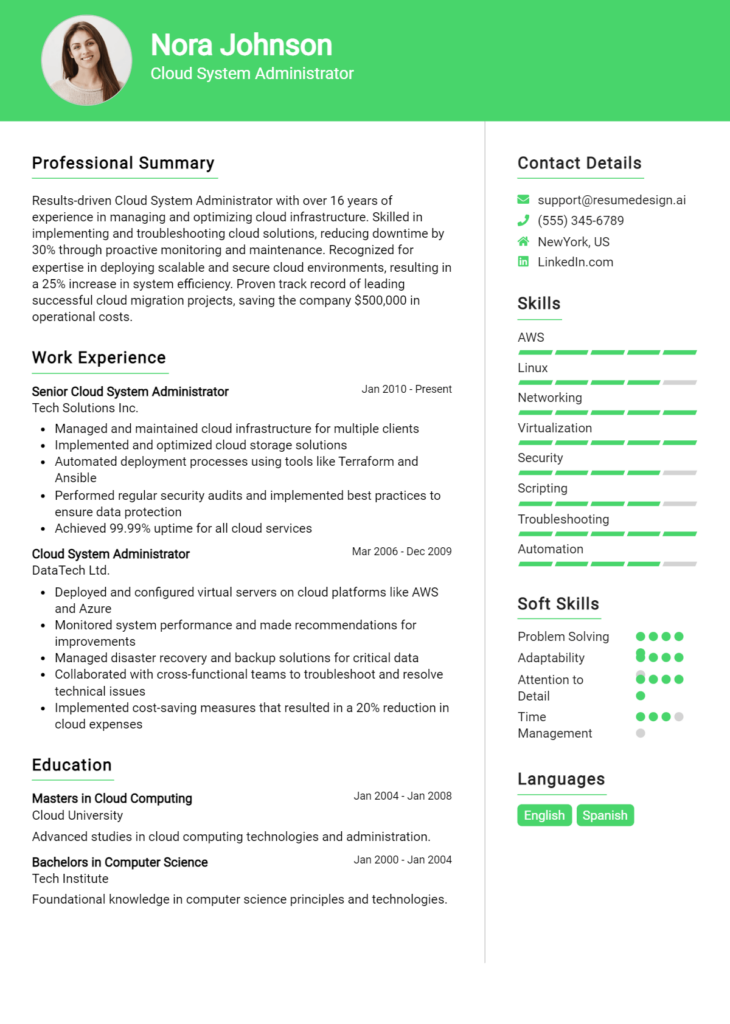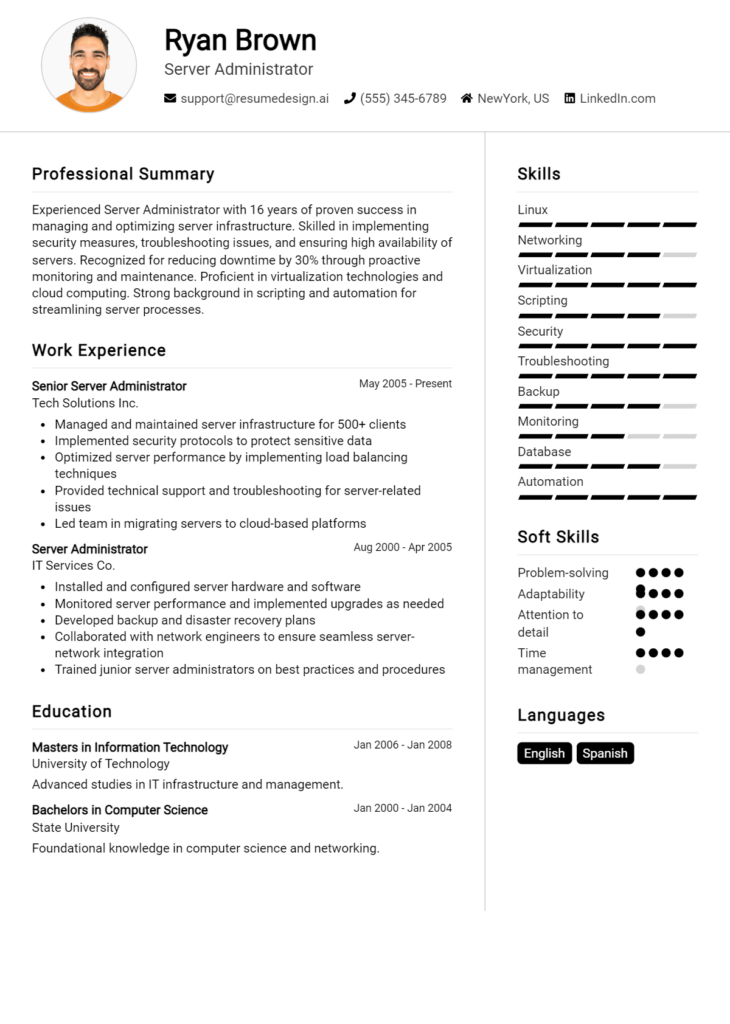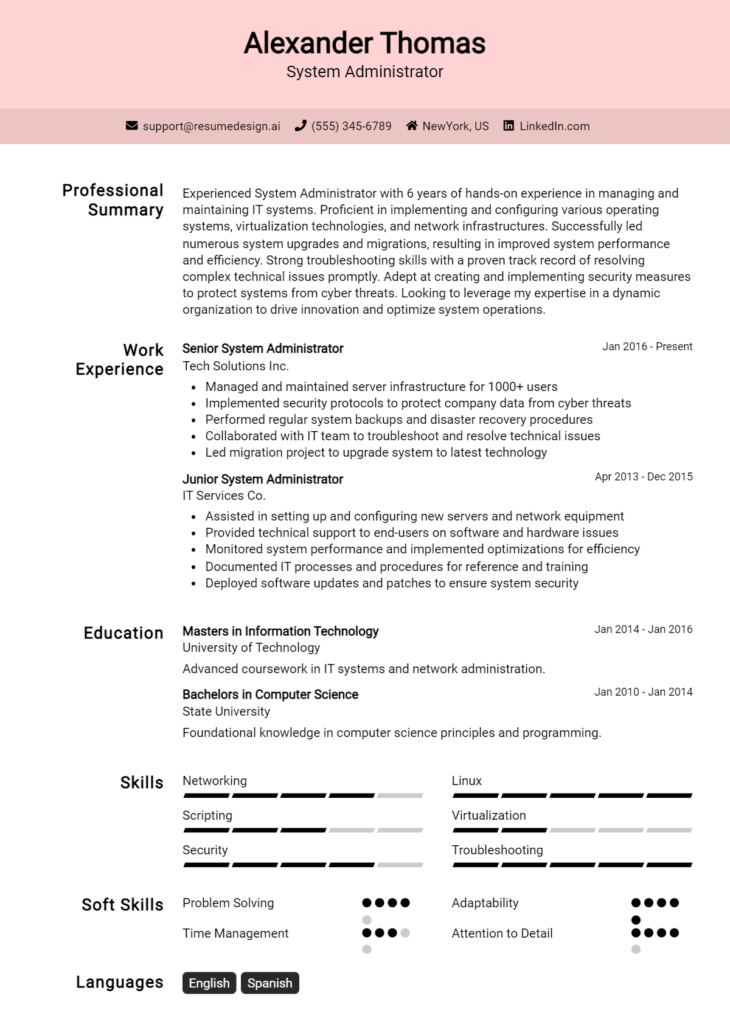Virtualization Administrator Core Responsibilities
A Virtualization Administrator plays a crucial role in managing and optimizing virtual environments, effectively bridging IT infrastructure with various organizational departments. Key responsibilities include configuring and maintaining virtual machines, ensuring system performance, and troubleshooting issues as they arise. Essential skills encompass technical expertise in virtualization technologies, strong operational knowledge, and adept problem-solving abilities. These competencies contribute significantly to organizational efficiency and scalability. A well-structured resume can effectively showcase these qualifications, demonstrating a candidate's readiness to enhance the organization's goals.
Common Responsibilities Listed on Virtualization Administrator Resume
- Designing and implementing virtualization solutions across multiple platforms.
- Monitoring and maintaining virtual environments to ensure optimal performance.
- Configuring and managing virtual machines, storage, and networking.
- Performing regular backups and disaster recovery planning.
- Troubleshooting and resolving virtualization-related issues.
- Collaborating with cross-functional teams to align virtualization strategies.
- Updating and patching virtualization software and hardware.
- Documenting processes, configurations, and best practices.
- Ensuring compliance with security policies and standards.
- Conducting capacity planning and resource allocation.
- Providing technical support and training to staff as needed.
High-Level Resume Tips for Virtualization Administrator Professionals
In today's competitive job market, a well-crafted resume is crucial for Virtualization Administrator professionals seeking to make a lasting impression on potential employers. Often serving as the first point of contact between candidates and hiring managers, a resume must effectively showcase not only technical skills but also significant achievements in the field of virtualization. It’s essential for your resume to reflect your unique qualifications and experiences that align with the specific demands of the role. This guide will provide practical and actionable resume tips tailored specifically for Virtualization Administrator professionals, helping you stand out in the applicant pool.
Top Resume Tips for Virtualization Administrator Professionals
- Tailor your resume to match the job description, using keywords and phrases that align with the requirements of the position.
- Highlight relevant experience by focusing on projects or roles that showcase your expertise in virtualization technologies.
- Quantify your achievements with specific metrics, such as percentage improvements in system performance or reductions in downtime.
- Include industry-specific skills, such as proficiency in VMware, Hyper-V, or KVM, to demonstrate your technical capabilities.
- Utilize a clean, professional layout that enhances readability and allows your key qualifications to shine through.
- Incorporate certifications relevant to virtualization, such as VCP or MCSE, to validate your expertise and commitment to the field.
- Emphasize soft skills, like problem-solving and teamwork, that are essential for collaborating with IT teams and stakeholders.
- Use action verbs to describe your responsibilities and accomplishments, making your contributions more impactful.
- Keep your resume concise, ideally one page, focusing on the most relevant information that aligns with the job you are applying for.
By implementing these tips, Virtualization Administrator professionals can significantly enhance their resumes, thereby increasing their chances of landing a job in this dynamic field. A polished and targeted resume not only reflects your qualifications but also conveys your dedication to excellence, making you a compelling candidate for potential employers.
Why Resume Headlines & Titles are Important for Virtualization Administrator
In the competitive field of IT, particularly for the role of a Virtualization Administrator, a well-crafted resume headline or title serves as a vital first impression. It acts as a succinct summary of a candidate's core qualifications and expertise, immediately capturing the attention of hiring managers. A strong headline should not only be concise and relevant but also tailored specifically to the job at hand, showcasing essential skills and experience that align with the needs of the organization. By effectively communicating value in just a few words, candidates can differentiate themselves from the competition and set the stage for a compelling resume presentation.
Best Practices for Crafting Resume Headlines for Virtualization Administrator
- Keep it concise—aim for one impactful phrase.
- Use role-specific keywords relevant to virtualization technologies.
- Highlight your most significant skills or achievements.
- Avoid vague language; be direct and specific.
- Consider incorporating measurable outcomes or certifications.
- Tailor the headline to match the job description of the position you’re applying for.
- Use action-oriented language to convey proactivity and expertise.
- Ensure it reflects your professional identity as a Virtualization Administrator.
Example Resume Headlines for Virtualization Administrator
Strong Resume Headlines
"Certified Virtualization Administrator with 5+ Years of Experience in VMware and Hyper-V Management"
"Results-Driven Specialist in Cloud Virtualization and Infrastructure Optimization"
“Expert in Virtual Environment Security and Performance Tuning for Mission-Critical Applications”
Weak Resume Headlines
“IT Professional”
“Looking for a Job in IT”
The strong resume headlines are effective because they provide clarity and focus, directly addressing the qualifications and expertise relevant to the role of a Virtualization Administrator. They highlight specific skills and experiences that resonate with hiring managers, making the candidate stand out. In contrast, the weak headlines fail to make an impression due to their generic nature; they lack the specificity needed to convey a candidate's unique strengths, making it difficult for employers to assess their fit for the position at a glance.
Writing an Exceptional Virtualization Administrator Resume Summary
A resume summary is a critical component for a Virtualization Administrator as it serves as the first impression a hiring manager will have of a candidate. A well-crafted summary quickly captures attention by succinctly showcasing key skills, relevant experience, and notable accomplishments that align with the job role. It is essential for the summary to be concise and impactful, tailored specifically to the position being applied for, ensuring it resonates with the hiring manager and sets the stage for the rest of the resume.
Best Practices for Writing a Virtualization Administrator Resume Summary
- Quantify Achievements: Use numbers and metrics to illustrate your impact, such as percentage improvements or cost savings.
- Focus on Relevant Skills: Highlight technical skills that are essential for virtualization, such as expertise in VMware, Hyper-V, or cloud technologies.
- Tailor to the Job Description: Customize your summary for each position by incorporating keywords and phrases from the job listing.
- Be Concise: Keep your summary to 3-5 sentences, ensuring every word adds value.
- Showcase Problem-Solving Abilities: Mention specific challenges you've overcome or efficiencies you've introduced in previous roles.
- Highlight Certifications: If applicable, include relevant certifications such as VCP (VMware Certified Professional) or MCSE (Microsoft Certified Solutions Expert).
- Use Action-Oriented Language: Start sentences with strong action verbs to convey your contributions and achievements effectively.
- Reflect Professional Growth: Mention progression in your career, indicating an upward trajectory in roles and responsibilities.
Example Virtualization Administrator Resume Summaries
Strong Resume Summaries
Dynamic and detail-oriented Virtualization Administrator with over 5 years of experience in deploying and managing VMware environments, resulting in a 30% increase in system efficiency. Proven track record of reducing operational costs by 20% through the implementation of automated solutions and continuous monitoring processes.
Highly skilled Virtualization Administrator with expertise in Hyper-V and cloud technologies, successfully migrating 100+ servers to a hybrid cloud infrastructure. Recognized for enhancing system uptime by 40% and improving disaster recovery time by 50% through strategic planning and execution.
Results-driven Virtualization Administrator with a strong foundation in network architecture and virtualization technologies. Achieved a 99.9% uptime for critical systems by optimizing resource allocation and implementing proactive maintenance protocols, leading to increased client satisfaction.
Weak Resume Summaries
Experienced IT professional looking for a Virtualization Administrator position. Skilled in various technologies and eager to contribute to team success.
Virtualization Administrator with some experience in managing servers. Interested in leveraging skills in a new role.
The strong resume summaries are considered effective because they provide specific metrics, demonstrate relevant skills, and directly relate to the responsibilities of a Virtualization Administrator. They showcase quantifiable achievements and emphasize the candidate's ability to drive results. In contrast, the weak summaries lack detail and specificity, failing to convey the candidate's unique qualifications or impact in previous roles, ultimately making them less appealing to hiring managers.
Work Experience Section for Virtualization Administrator Resume
The work experience section of a Virtualization Administrator resume is critical as it serves as a testament to the candidate's technical competencies, leadership capabilities, and their ability to deliver high-quality virtualized environments. This section not only highlights the specific skills possessed by the candidate but also provides insight into their experience managing teams and projects. By quantifying achievements and aligning them with industry standards, candidates can demonstrate their impact on organizational performance and efficiency, making this section a vital component of their overall application.
Best Practices for Virtualization Administrator Work Experience
- Highlight relevant technical skills, including specific virtualization technologies such as VMware, Hyper-V, or KVM.
- Quantify achievements with metrics, such as cost savings, performance improvements, or uptime percentages.
- Focus on leadership roles and team management experience, showcasing your ability to lead projects and collaborate effectively.
- Describe your experience with automation and scripting to improve processes and efficiency.
- Align your experiences with industry standards and best practices, demonstrating knowledge of compliance and security measures.
- Use action verbs to convey your contributions clearly and dynamically.
- Tailor your experience to the job description, ensuring relevance to the specific role you're applying for.
- Incorporate feedback from peers or supervisors to illustrate your collaborative efforts and impact on team success.
Example Work Experiences for Virtualization Administrator
Strong Experiences
- Successfully led a team in migrating over 500 virtual machines to a new cloud infrastructure, resulting in a 30% reduction in operational costs.
- Implemented a comprehensive disaster recovery plan that improved system recovery time from 24 hours to under 2 hours, enhancing business continuity.
- Automated backup processes for virtual environments, achieving a 40% increase in backup efficiency and reducing manual errors.
- Collaborated with cross-functional teams to design and deploy a secure virtual desktop infrastructure, which improved user satisfaction ratings by 25%.
Weak Experiences
- Responsible for managing virtual machines and ensuring they run smoothly.
- Worked on various IT projects related to virtualization.
- Helped the team with some virtualization tasks.
- Participated in discussions about virtualization solutions.
The examples categorized as strong demonstrate clear, quantifiable outcomes and specific leadership roles, showcasing the candidate's ability to make a significant impact. In contrast, the weak experiences lack detail and measurable results, making them less compelling to potential employers. By providing specific achievements and responsibilities, strong experiences effectively convey the candidate's value and expertise as a Virtualization Administrator.
Education and Certifications Section for Virtualization Administrator Resume
The education and certifications section of a Virtualization Administrator resume plays a crucial role in establishing the candidate's qualifications and expertise in the field. This section showcases the applicant's academic background, industry-recognized certifications, and commitment to continuous learning. By providing relevant coursework, specialized training, and up-to-date certifications, candidates can significantly enhance their credibility and demonstrate their alignment with the specific requirements of the job role. Employers often look for evidence of a solid educational foundation combined with practical, recognized credentials that validate the candidate's skills in virtualization technologies.
Best Practices for Virtualization Administrator Education and Certifications
- Focus on relevant degrees such as Computer Science, Information Technology, or Systems Administration.
- List industry-recognized certifications like VMware Certified Professional (VCP), Microsoft Certified: Azure Administrator Associate, or Citrix Certified Professional.
- Include details of specialized training programs or workshops that enhance your virtualization skills.
- Highlight any coursework related to virtualization, cloud computing, and systems management.
- Be specific about the level of certification attained (e.g., Associate, Professional, Expert).
- Keep the section updated to reflect the latest certifications and any continuous education efforts.
- Organize certifications in order of relevance, placing the most pertinent ones at the top.
- Consider including dates of certification to demonstrate currency of knowledge and skills.
Example Education and Certifications for Virtualization Administrator
Strong Examples
- Bachelor’s Degree in Computer Science, XYZ University, 2020
- VMware Certified Professional (VCP) – Data Center Virtualization, 2021
- Microsoft Certified: Azure Solutions Architect Expert, 2022
- Coursework in Cloud Computing and Virtualization Technologies, ABC Institute, 2021
Weak Examples
- Associate Degree in General Studies, DEF College, 2018
- CISCO Certified Network Associate (CCNA), 2015 (Outdated for virtualization roles)
- Certificate in Basic Computer Skills, GHI Training Center, 2019
- High School Diploma, JKL High School, 2017
The strong examples are considered effective because they are directly relevant to the Virtualization Administrator role, showcasing specific degrees and certifications that are highly regarded in the industry. They reflect up-to-date qualifications that align with current technology trends and employer expectations. In contrast, the weak examples lack relevance to the virtualization field, either because they pertain to outdated certifications, general studies without focus, or do not demonstrate advanced knowledge in virtualization technologies. This distinction underscores the importance of tailoring one’s education and certifications to match the demands of the position.
Top Skills & Keywords for Virtualization Administrator Resume
In the rapidly evolving field of IT, a well-crafted resume for a Virtualization Administrator is crucial in showcasing your expertise and attracting potential employers. A strong emphasis on relevant skills can set you apart from other candidates, demonstrating your ability to optimize and manage virtual environments effectively. Employers seek professionals who not only possess technical know-how but also excel in interpersonal and problem-solving abilities. By highlighting your top skills, you can provide a clear picture of your capabilities and align them with the specific requirements of the role, making your resume impactful and compelling.
Top Hard & Soft Skills for Virtualization Administrator
Soft Skills
- Excellent problem-solving abilities
- Strong communication skills
- Effective time management
- Team collaboration and support
- Adaptability and flexibility
- Critical thinking
- Attention to detail
- Customer service orientation
- Project management
- Conflict resolution
Hard Skills
- Proficient in VMware and Hyper-V platforms
- Experience with cloud computing technologies (e.g., AWS, Azure)
- Knowledge of Linux and Windows Server administration
- Virtual networking and storage management
- Backup and disaster recovery solutions
- Scripting and automation (e.g., PowerShell, Bash)
- Performance tuning and optimization
- Security best practices for virtual environments
- Capacity planning and resource allocation
- Familiarity with containerization technologies (e.g., Docker, Kubernetes)
By focusing on these essential skills and ensuring your work experience effectively illustrates your capabilities, you can create a standout resume that highlights your qualifications for the role of a Virtualization Administrator.
Stand Out with a Winning Virtualization Administrator Cover Letter
Dear [Hiring Manager's Name],
I am writing to express my interest in the Virtualization Administrator position at [Company Name], as advertised on [Job Board/Company Website]. With a robust background in IT infrastructure management and a specialization in virtualization technologies, I am excited about the opportunity to contribute to your organization's goals. My experience with VMware, Hyper-V, and cloud platforms such as AWS has equipped me with the knowledge and skills necessary to optimize system performance and enhance operational efficiency.
In my previous role at [Previous Company Name], I successfully managed a virtualized environment that supported over [number] servers and [number] virtual machines. By implementing best practices in resource allocation and monitoring, I was able to reduce operational costs by [percentage]% while improving system reliability and uptime. My proactive approach to troubleshooting and maintenance has allowed me to minimize downtime and ensure that our virtual infrastructures are consistently aligned with business needs.
Furthermore, I am committed to staying ahead of industry trends and emerging technologies. I have pursued various certifications, including [relevant certifications], which have deepened my understanding of virtualization strategies and their application in real-world scenarios. I am particularly drawn to [Company Name] because of your commitment to innovation and excellence in IT services, and I believe my technical expertise and problem-solving skills would be an asset to your team.
I am eager to bring my strong analytical skills and technical proficiency to the Virtualization Administrator position at [Company Name]. Thank you for considering my application. I look forward to the opportunity to further discuss how I can contribute to the continued success of your IT department.
Sincerely,
[Your Name]
[Your Phone Number]
[Your Email Address]
Common Mistakes to Avoid in a Virtualization Administrator Resume
When crafting a resume for the role of a Virtualization Administrator, it’s crucial to present your skills and experience effectively to stand out in a competitive job market. However, many candidates make common mistakes that can diminish their chances of landing an interview. By avoiding these pitfalls, you can create a more compelling resume that highlights your qualifications and showcases your expertise in virtualization technologies.
Neglecting Relevant Keywords: Failing to include industry-specific keywords can result in your resume being overlooked by applicant tracking systems (ATS) that scan for particular terms related to virtualization.
Overloading with Technical Jargon: While it's important to demonstrate your technical proficiency, too much jargon can alienate non-technical hiring managers. Aim for a balance that showcases your expertise while remaining accessible.
Omitting Soft Skills: Virtualization Administrators often work in team environments or interact with clients. Neglecting to mention soft skills like communication and problem-solving can give an incomplete picture of your capabilities.
Lack of Quantifiable Achievements: Simply listing duties and responsibilities does not effectively communicate your impact. Use quantifiable achievements, such as "reduced server downtime by 30%" to illustrate your contributions.
Ignoring Formatting and Clarity: A cluttered or poorly formatted resume can detract from your qualifications. Ensure your resume is well-organized with clear headings, bullet points, and consistent formatting to enhance readability.
Inadequate Customization: Sending out a generic resume can be detrimental. Tailor your resume to match the specific job description, emphasizing the skills and experiences that are most relevant to the position.
Failing to Update Skills: The field of virtualization is constantly evolving. Not updating your resume with the latest technologies or certifications can make it seem like your skills are outdated.
Skipping Professional Development: Neglecting to include ongoing training, certifications, or relevant courses can indicate a lack of commitment to professional growth. Always highlight any relevant learning experiences to show your dedication to staying current in the field.
Conclusion
As we have explored the critical responsibilities and skills required for a Virtualization Administrator, it's clear that this role plays a pivotal part in managing and optimizing virtual environments. Key takeaways include the importance of expertise in virtualization technologies, a solid understanding of networking concepts, and the ability to troubleshoot complex system issues. Additionally, effective communication and collaboration skills are essential for working with cross-functional teams to ensure seamless operations.
Now that you have a comprehensive understanding of what it takes to excel as a Virtualization Administrator, it's the perfect time to review and refine your resume. A well-crafted resume can set you apart in the competitive job market and showcase your unique qualifications and experiences.
To aid you in this process, consider utilizing resources like resume templates that can help you format your information professionally. If you're looking for a more hands-on approach, the resume builder offers customizable options to create a standout resume tailored to your strengths. Additionally, browsing through resume examples can provide inspiration and insight into how to present your skills effectively. Don’t forget about the importance of a strong first impression; using cover letter templates can also enhance your application package.
Take action today and elevate your career as a Virtualization Administrator by reviewing and updating your resume with these valuable tools!

